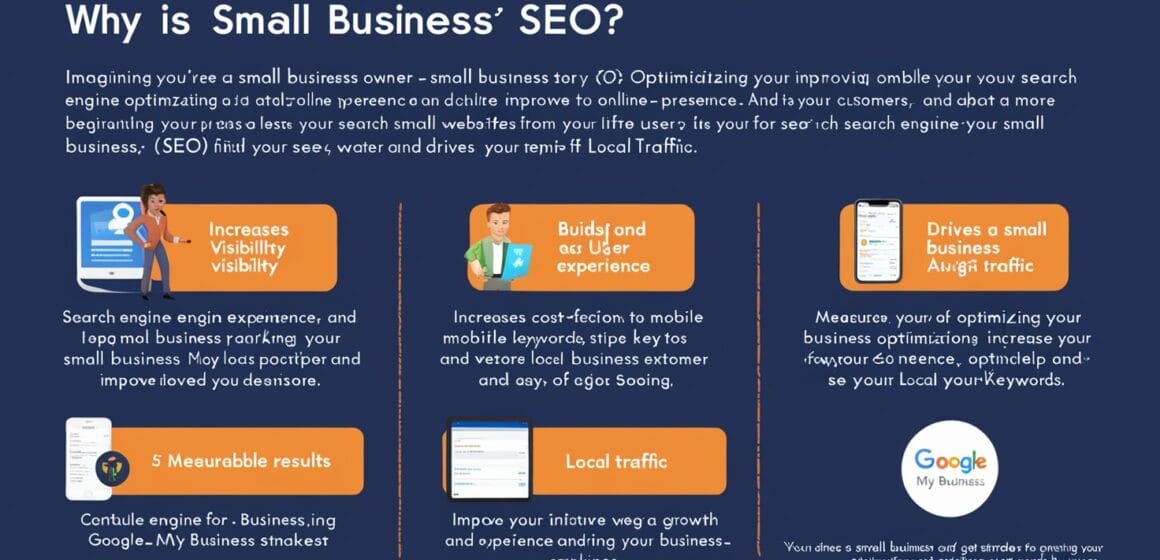In today’s digital-first world, a strong online presence is essential for small businesses. But having a website alone is not enough. To stand out in a crowded digital marketplace, your business needs to be visible—and that’s where Search Engine Optimization (SEO) comes in. SEO is the process of optimizing your website to rank higher on search engine results pages (SERPs), making it easier for potential customers to find you.
Here’s why SEO is crucial for your small business website and how it can drive growth, visibility, and long-term success.
1. Increases Visibility and Traffic
When customers search for products or services you offer, appearing at the top of the search results significantly increases the chances they’ll click on your website. Studies show that the first five results on Google account for nearly 70% of all clicks.
Why This Matters for Small Businesses:
- Competing with Bigger Brands: SEO levels the playing field, allowing small businesses to compete with larger companies by targeting local and niche keywords.
- Attracting Qualified Leads: Optimizing for the right keywords ensures you’re reaching people who are actively searching for what you offer.
2. Builds Credibility and Trust
When your website ranks high on search engines, it signals credibility and authority to users. SEO practices like creating high-quality content, earning backlinks, and optimizing for user experience contribute to this trust.
Benefits of Credibility:
- Customer Confidence: A well-optimized website with valuable content builds trust, increasing the likelihood of conversions.
- Brand Authority: Over time, consistent SEO efforts establish your business as an industry expert.
3. Provides a Cost-Effective Marketing Strategy
For small businesses with limited marketing budgets, SEO offers a cost-effective way to drive organic traffic compared to paid advertising campaigns. While SEO requires an investment of time and effort, the results are long-lasting and compound over time.
Why It’s Cost-Effective:
- Sustainable Growth: Unlike ads that stop driving traffic once the budget runs out, SEO continues to deliver results without ongoing ad spend.
- Targeted Traffic: By optimizing for specific keywords, you attract highly relevant visitors who are more likely to convert into customers.
4. Enhances User Experience
SEO isn’t just about search engines—it’s also about improving the overall user experience on your website. Search engines prioritize websites that are mobile-friendly, fast-loading, and easy to navigate.
Key User Experience Improvements:
- Mobile Optimization: With the majority of searches happening on mobile devices, SEO ensures your site performs well across all devices.
- Faster Load Times: A fast website not only ranks higher but also keeps visitors engaged, reducing bounce rates.
- Easy Navigation: Intuitive site architecture makes it easier for both users and search engines to find your content.
5. Drives Local Traffic
For small businesses, attracting customers in your immediate area is often the priority. Local SEO optimizes your website for location-specific searches, helping you appear in “near me” searches and Google Maps results.
Local SEO Strategies:
- Google My Business: Claiming and optimizing your GMB listing ensures you appear in local map packs.
- Localized Keywords: Using phrases like “best coffee shop in [City]” helps you rank for location-based searches.
- Customer Reviews: Positive reviews boost your local rankings and build trust with potential customers.
6. Delivers Measurable Results
One of the greatest advantages of SEO is its measurability. With tools like Google Analytics, you can track key metrics like organic traffic, keyword rankings, and conversion rates to understand what’s working and adjust your strategy accordingly.
Key Metrics to Monitor:
- Traffic Sources: Know where your visitors are coming from.
- Keyword Performance: Track which search terms are driving the most traffic.
- Conversion Rates: Measure how well your website is turning visitors into customers.
7. Prepares Your Business for the Future
The digital landscape is constantly evolving, and businesses that invest in SEO are better equipped to adapt. As voice search, artificial intelligence, and mobile-first indexing become more prominent, having a strong SEO foundation ensures your business remains competitive.
Future-Proofing Benefits:
- Voice Search Optimization: Tailoring content for conversational queries helps you stay relevant as voice assistants gain popularity.
- Adaptability: SEO ensures your website meets the latest search engine algorithms and trends.
Conclusion
For small businesses, SEO is no longer optional—it’s a necessity. It drives visibility, builds trust, and provides a cost-effective way to attract and retain customers. By investing in SEO, you’re not just optimizing your website; you’re setting the stage for long-term growth and success in a competitive digital world.
So, whether you’re just starting out or looking to take your online presence to the next level, SEO should be at the core of your digital marketing strategy. With the right approach, your small business can achieve big results.




Leave a Reply